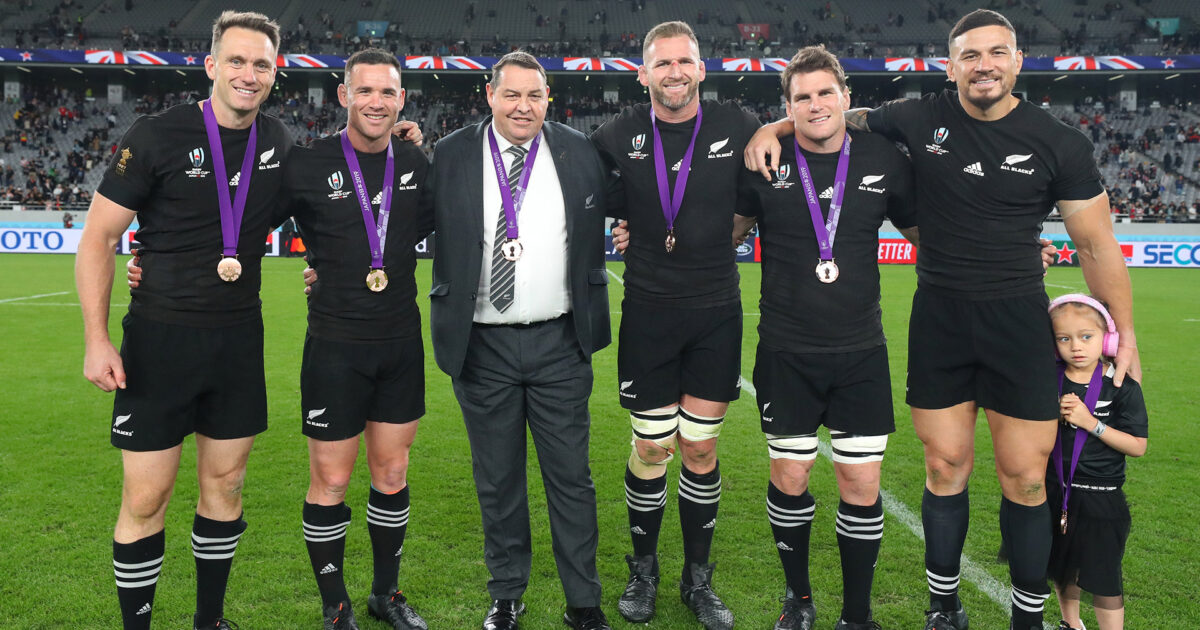'If I had my time again, I would have picked him': Hansen's 2019 World Cup selection regret

Sir Steve Hansen has revealed his World Cup selection regret from the All Blacks failed bid in Japan for three consecutive World Cup crowns in 2019.
In Hansen’s last run as All Blacks head coach he made some bold calls to refresh the side after a shock 47-26 defeat to the Wallabies in Perth in that year’s Rugby Championship.
Paying the price for the defeat, wingers Rieko Ioane and Ben Smith were dropped from the side in favour of Crusaders’ pair George Bridge and Sevu Reece.
The All Blacks went on to defeat the Wallabies 36-0 in Auckland in the return Bledisloe with the new pair of wings and never looked back, starting Bridge and Reece for all the big clashes at the World Cup.
The 2015 World Cup-winning coach shared his regret over not selecting Smith for the fateful semi-final to England, which ended in a 19-7 defeat to Eddie Jones’ side.
“If I had my time again, I would have picked him,” Hansen wrote for Smith’s autobiography, Ben Smith: More Than A Game.
The coach had explained at the time his axing of Smith was down to a ‘loss of self-belief and confidence’ due to injury or retirement, a reason that didn’t sit well with the All Black utility back.
“I found it really hard that he put that out in the media,” the 84-Test All Black explained in his autobiography.
“Steve hadn’t actually sat down with me and talked that through and that was an outlet he didn’t need to go to.”
The All Blacks banked on competing with England’s lineout with Scott Barrett at No 6, which in the end proved a miscalculated decision, reducing the need for a high ball specialist like Smith to compete for contested kicks on the right wing.
Hansen also acknowledged that Smith’s experience would have helped in a game where the All Blacks struggled to find a footing against a rampant England team.
Smith, along with other veteran backs Ryan Crotty, Sonny Bill Williams were overlooked for the starting side with Williams coming off the bench late.
The Highlanders fullback knew going into the tournament it would be his last hurrah and felt he still had something to offer.
“That was always going to be my last All Black campaign and I felt I still had some rugby in me,” Smith writes.
“It was frustrating because my family had come over to support me. They were really good but probably a bit sensitive to the fact they knew I was hurting with how some things played out.”
In the bronze medal match against Wales, Smith was handed a start and went out in style with two tries in a 40-17 win.






























Hansen did well up to RWC2015 but by 2017 we'd become stagnant. The BILs' tour was drawn but no lessons were learned by RWC2019 semi v England. It was game over by HT, that's how much dominance Eng had despite the close score at the time. Foster's a Hansen mini-me without the same abilities. No wonder the ABs have declined so much since 2019.
If we are being honest, Reece and Bridge didnt put a foot wrong in that game. We were manhandled through the middle. If there were changes to be made it was in the physicality of our pack and midfield...
Maybe Hansen stayed too long. He seemed to lose his nerve. In 2014/15 he stuck by Dan Carter through all sorts of travails, and it paid off. By 2019 he couldn't find the same patience and faith in respect of Ben Smith and Reiko Ioane, and we ended up with journeymen like George Bridge and Sevu Reece on the flanks. Then there's the mid-field, where Sonny Bill seemed like the ideal foil for Manu Tualagi but couldn't get a start. Similarly, I'm great fan of Scott Barret at 6, but to introduce him to that role at semi-final time confirmed that Hansen had lost the plot.
Still think that Hansen et al weren’t the brains of the coaches, Wayne Smith was and after he went the downhill slide started, and is still going on.
The problem was Smith was not being played in his preferred role - a constant mistake of Hanson. But it was huge mistake to go into the RWC semi final with a very inexperienced backline - yes Beauden had 80 caps and ALB 40 at the time, but Mo'unga <20, Goodhue < 20, Reece <10 and Bridge <10 caps and they were shown up.
Yes I remember the idotic decision by John Mitchell to drop Cullen for 2003
At the time I thought it was dumb not picking Smith, as he was still the best fullback in the world in 2019, but Cullen was also dropped while he was number one. Poor team selection is the easiest way of shooting yourself in the foot.